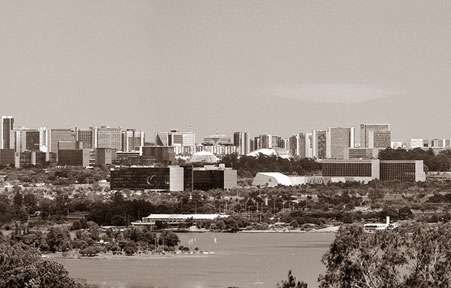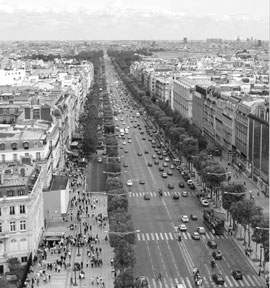|
World Town Planning Day tomorrow:
Towards healthy people and healthy cities
by Dr. Jagath MUNASINGHE
The World Town Planning Day would be celebrated in all parts of the
world tomorrow under a timely theme 'Healthy people, healthy cities'.
 |
|
A well-planned city |
Sri Lanka too is celebrating the occasion with a few events led by
the Institute of Town Planners Sri Lanka. However, any occasion is
'proudly celebrated' when the celebrators find some level of dignity of
what they have achieved.
Over the past two decades we have witnessed the run-down conditions
of the few cities in Sri Lanka including Colombo and the large number of
medium and small-scale towns which are scattered in all parts of the
island. They are ill-fated in many ways. Many of their local roads are
badly constructed and impassable on rainy days. Drains are filled with
garbage and sludge. The water stagnating in them provide breeding
grounds for mosquitoes, flies and other insects. Waste dumps have become
a common sight in almost all of them, an eyesore as well as a pollutant.
Prolonged traffic congestions are a common experience for all those who
visit these cities. The environmental conditions have been worsened by
vehicular emissions and noise.
Paddy, marshy and agricultural lands were increasingly reclaimed.
These physical developments go hand-in-hand with increasing heat and
stuffy atmospheric conditions. Inconsistent modern-styled buildings have
added hyper-realistic characteristics to the towns although they could
irritate the inhabitants. Disorder, chaos and disregard have become
integrated elements of those settings.
Users of the towns, especially care-needy pedestrians such as
children, the elderly and the differently abled have become helpless
creatures amidst these gigantic mobile machines that have swallowed
almost all possible free space in the streets.
What can be done to get out of this messy situation?
Management deficiency
If one examines this scenario carefully, it is not difficult to
understand that the sad situation is caused by a few common
deficiencies. The first is the management deficiency that has led them
to the present state. Management is a process that is geared towards
achieving a set of objectives or targets through orderly, legitimate and
economical means. Good management is supported by the determination,
updated knowledge and range of managerial skills, space for wider
participation and the adoption of sustainable practices. Hence, any
organisation that aspires to the good management of its affairs needs to
have persons equipped with the knowledge and skills and determined to
achieve their targets.
 The local authorities need to have urban managers who will take them
from their unhealthy situation and keep them in a good state. Almost all
local authorities in Sri Lanka, Municipal Councils, Urban Councils and
Pradeshiya Sabhas have enormous resources untapped and underutilised. The local authorities need to have urban managers who will take them
from their unhealthy situation and keep them in a good state. Almost all
local authorities in Sri Lanka, Municipal Councils, Urban Councils and
Pradeshiya Sabhas have enormous resources untapped and underutilised.
They all have numerous ways of collecting revenue, as provided by the
statutes, under which they have been established, yet uncollected due to
ignorance, lethargy and lack of will.
Local authorities
If these resources are well mobilised and if the revenue is duly
collected, the local authorities have no reason to rely and depend upon
central government funding. They will be able to maintain their own
roads, drainage systems, waste disposal and town spaces. It will be the
task of the urban managers to revitalise and activate the relevant
systems within the local authorities.
Urban managers will also be responsible to develop wider awareness
among all citizens and get their participation in all matters of the
local government. Only through such processes will we be able to achieve
healthy cities. Town planners will be the ideal candidates to bear the
positions of these urban managers.
Hence, it is time that town planners deviate from their conventional
task of land use planning and shoulder the responsibilities of urban
management.
The second is the information deficiency that hampers all local
authorities from engaging in progressive work. One of the prerequisites
for an efficient management of the revenue, services, and the
environmental quality of a town is the readily available base of
information. The progress of any work depends much upon the availability
and the reliability of the information. All local authorities have heaps
and heaps of documentation work related to different kinds of
information.
 |
|
Good town planning |
Sadly, these records reveal facts and figures that are collected on a
timely basis but slowly updated; revealing many facets, but least
integrated; rather comprehensive, but less versatile to handle. Any
information related to street lines; conditions of properties, their
owners, occupants, market values, rents, legal status; waste collection;
drainage network; road conditions; within an area of a few square
kilometres can be obtained by a citizen only after many visits to the
office of the local authority. In some instances, the information is not
easily accessible even to the relevant officers.
This situation not only causes unnecessary delays related to
development activities in towns, while adding huge unnoticed costs on
local authority budgets, but also provides a good ground for bribery and
corruption. The way out is the establishment of broad information
systems within local authorities.
On one hand, these organisations are not aware of such improved
technology and state-of-the-art information systems, thus, limiting
themselves to existing outdated processes. On the other hand, they do
not have persons who are equipped with the requisite skills to develop
and maintain such information systems.
Hence, it is time that all local authorities recruit information
administrators who are well trained in geographic information, remote
sensing, systems analysis and information management. Their task will be
to establish and maintain updated spatial information systems for areas
of jurisdiction of the local authorities and provide information to the
urban managers.
Although there can be many professionals good at handling information
technology, town planners, well equipped with spatial information
management skills, are the ones who are aware of the purpose and the
type of information required for the development work in towns. Hence,
town planners may think of diversifying their activities to include
management of information into their scope of work.
Urban design deficiency
The third is the urban design deficiency that all urban areas have
suffered over the past two decades.
The prevalent trends of development in towns cannot be regarded as
healthy at any level. Their physical developments are disorderly and at
most instances destroy the precious character of space, disturbs natural
geographic features, mask invaluable vistas that added beauty to those
places and impose alien structures on them.
Despite the fact that 'planning is meant for public interest' one may
wonder whether our urban plans and development projects over the past
few decades were meant for the public. Statistics show that while more
than eighty percent of the people use public transport and walk, only
less than twenty percent travel in motor cars in towns to get their work
done. Yet, our towns have less space for pedestrians but more space for
motor vehicles. Even the smallest area demarcated for pedestrians is
sometimes forcibly occupied by parked vehicles. To get their work done
users have to walk longer distances from one facility to another.
The walk is mostly not smooth as the walkways usually have potholes,
debris and uplifted drain-cover blocks. At the same time, users are
always helpless in tropical climatic conditions that prevail throughout
the year.
 |
|
A traffic jam in
Colombo |
They are victimised alternately by the hot sun and heavy rains.
Hence, these towns are healthy for motorists and motor vehicles, but
certainly not for people. The need thus is to have skilled and
well-trained urban designers, who can think beyond technical and
economic aspects of urban development, employed in local authorities.
Their task is to develop and implement urban design guides for the
development of towns within the framework provided by the apex
authorities. The town planners in Sri Lanka today have more sensitivity
to the environments they deal with and are equipped with urban design
skills. Hence, it will be the responsibility of the local authorities to
recognise these skills and make use of them.
In summary, to overcome the pathetic conditions of our towns, the
local authorities need to strengthen their capacities. There are three
areas where such strengthening is required, namely, urban management,
information administration and urban design.
Both the profession of town planning and the authorities of our towns
may give more thought to these aspects. If adopted, we will be proudly
celebrating a Town Planning Day within the next few years, when Sri
Lanka becomes the Miracle of Asia.
The writer is a Chartered Architect and Town Planner and is Head of
the Department of Town and Country Planing, University of Moratuwa.
|

